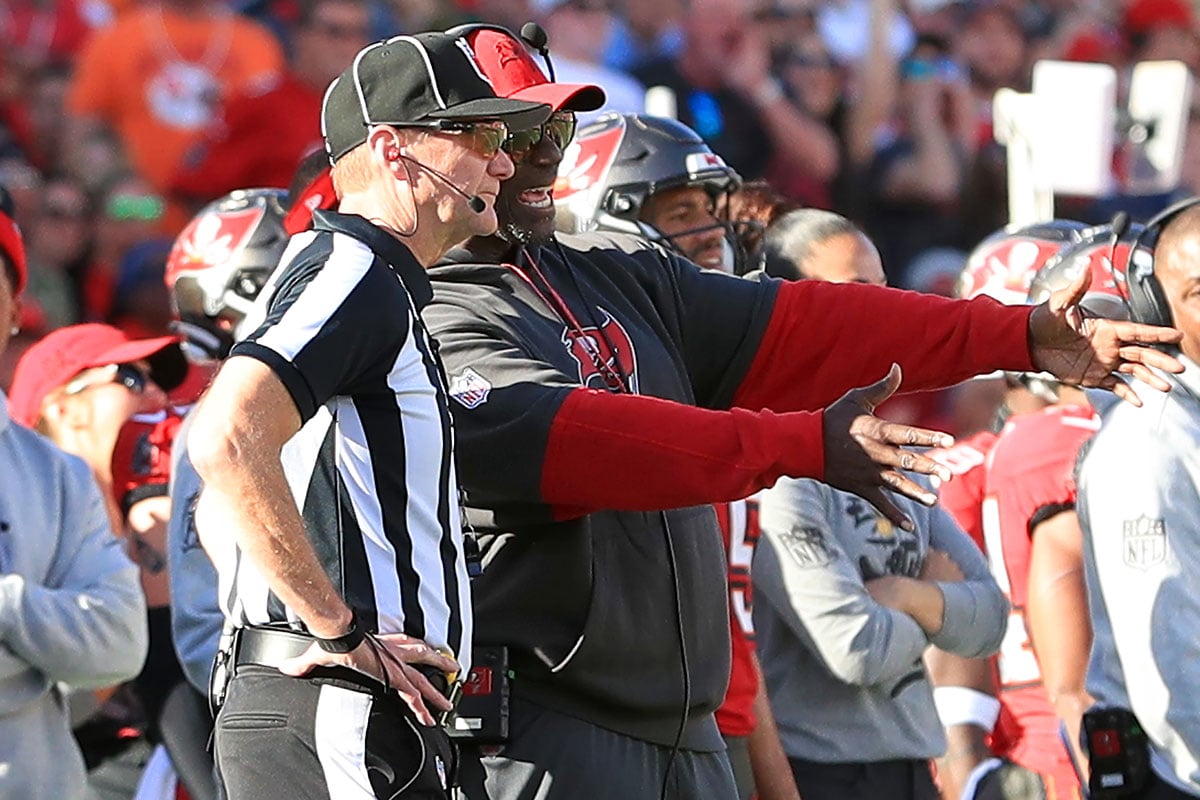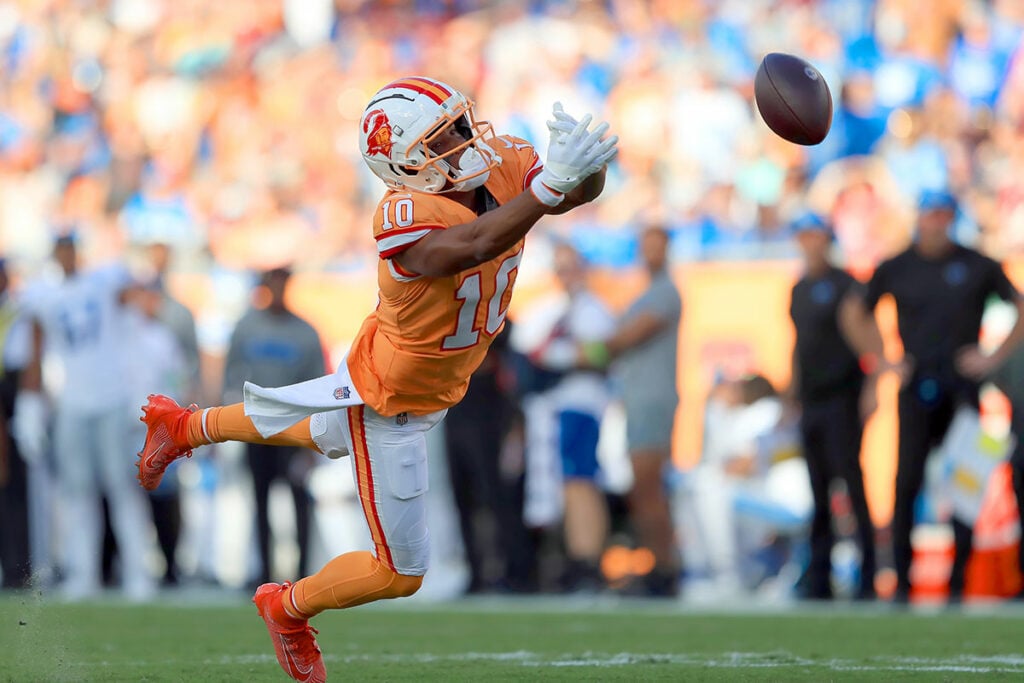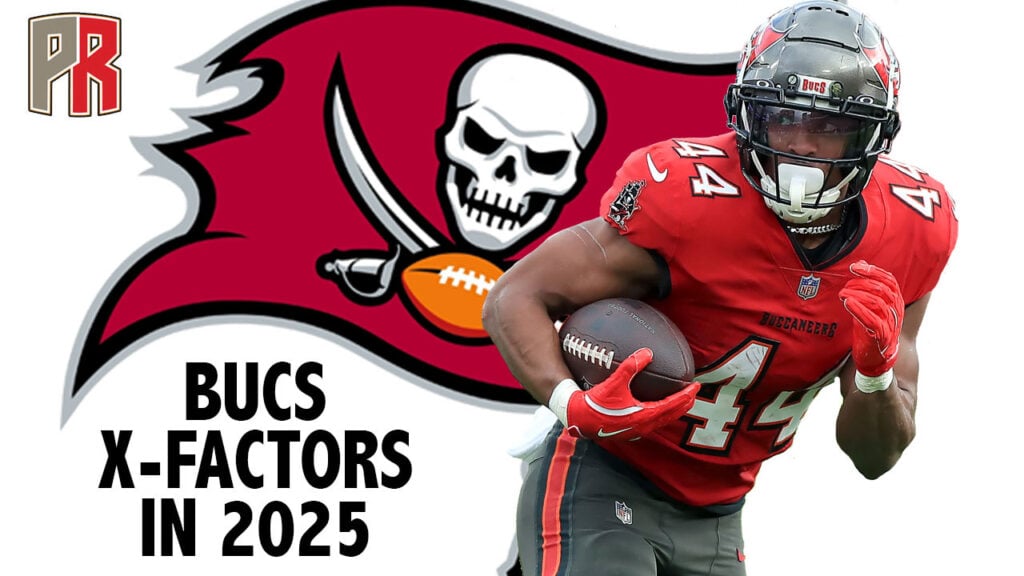Last week’s news of Bucs general manager Jason Licht and head coach Todd Bowles getting contract extensions was mostly well-received.
Licht’s track record – dating back to 2014 – is a positive one as he built one Super Bowl champion squad in 2020 and has worked wonders retooling Tampa Bay’s roster to open another Super Bowl window this season and into the near future.
Then there is Bowles.
While the veteran defensive playcaller has a solid track record of leading defenses, his track record leading teams is more of a mixed bag. He has said all the right things throughout this offseason, but he has no more excuses leading the Bucs on a Super Bowl run in 2025.
Todd Bowles Has All The Help He Needs To Get Bucs’ Defense Back On Track
Todd Bowles did not have it easy taking over the head coaching reins from Bruce Arians back in 2022.
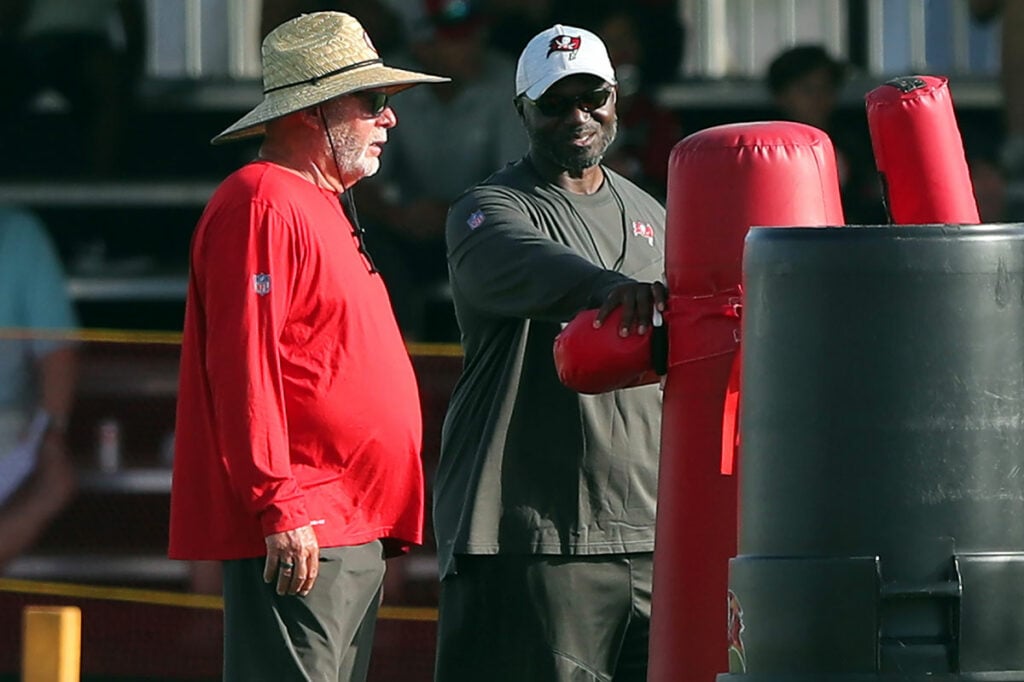
Former Bucs HC Bruce Arians and Bucs HC Todd Bowles – Photo by: Cliff Welch/PR
Bowles inherited Arians’ coaching staff mid-offseason and made the most of the circumstances. One can applaud the work he did keeping the distractions to a minimum when it came to quarterback Tom Brady missing part of training camp and in the midst of personal matters and a looming divorce during his last NFL season.
That year, most of the issues stemmed on the offensive side of the football. Offensive coordinator Byron Leftwich’s play-calling came under fire as the once high-scoring unit floundered averaging just 18.4 points per game, a mark that ranked 25th in the league. That mark was a far cry from the heights of 2020 (30.8, third) and 2021 (30.1, second). It came as no surprise, then, that Bowles fired Leftwich after the Bucs struggled to an 8-9 regular-season record and first-round playoff loss. Still, Bowles’ defense kept them in games and allowed just 21.1 points per game that year, the 13th-best mark.
Many fans worried that the organization would go back to the losing ways of old, though, after a 45-year-old Brady retired. Thanks to the defensive wizardry of Bowles up to that point, he was given a longer leash to make things work and to lead the team as they retooled from a veteran core to being one of the league’s youngest rosters.
Now it is Bowles’ turn to get the defense to step back up.
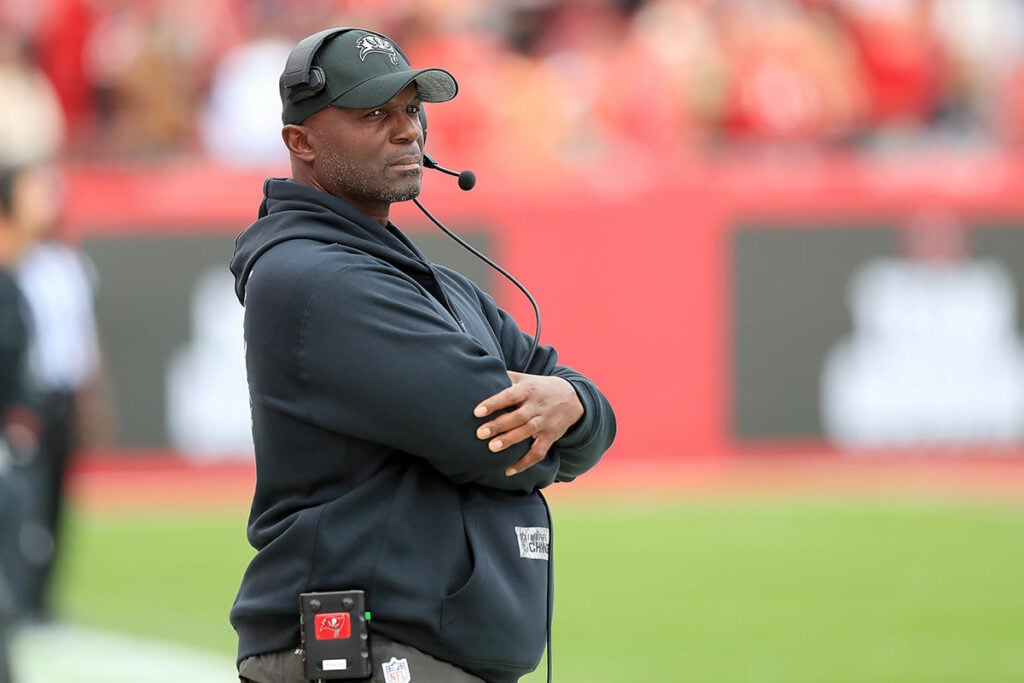
Bucs HC Todd Bowles – Photo by: Cliff Welch/PR
Negative defensive trends started to become apparent during the 2023 season. The Bucs defense improved to allowing just 19.1 points per game (seventh best), but they allowed dismal marks in the passing game. They finished 23rd in total yards allowed, stemming from ranking 29th in passing yards allowed. Last season, the defense allowed 22.6 points per game (16th), was 18th in total yards allowed, but again ranked 29th in passing yards allowed and was 26th in interceptions.
What was once a dominant secondary quickly turned into a group lacking playmaking ability and allowing opposing wide receivers to have a field day piling up numbers. To better support the offense and emerge as an elite team, the defense needs to return to its ways of old.
That is up to Bowles – as he now has all the pieces he needs.
Starting upfront, the pass rush should be mightily improved replacing Joe Tryon-Shoyinka with Haason Reddick, if Reddick gets back to his double-digit sack numbers. It is fair to expect improvement from 2023 draft picks Yaya Diaby and Calijah Kancey, with veteran Vita Vea remaining a force. Lavonte David returns at inside linebacker, a position that should be better with a healthy SirVocea Dennis and newcomer Anthony Walker Jr. playing a role. There is enough talent in the front seven to expect them to remain elite at stopping the run and regularly get after the quarterback.
Both the pass rush and middle of the field have plagued the team, but the secondary has contributed most to negatively deciding games.
Needing to acquire impactful playmakers and get better depth at cornerback and safety, Jason Licht went out and drafted Benjamin Morrison and Jacob Parrish in the second and third rounds while re-signing veteran Bryce Hall. That moves Tykee Smith back to safety, pairing with Antoine Winfield Jr.
One can look at all the moves the Bucs made this offseason and confidently say they got better from a player personnel standpoint. Bowles should not run into the issues he had last season when the depth was tested at several key positions.
At the end of January, I opined that Bowles was going to face his biggest challenges yet as a head coach. Losing offensive coordinator Liam Coen in the manner it unfolded stung as the team had to move quickly to find his replacement. Defensive coaching changes were looming. The defense as a whole needed to be improved and coached up.
What did Bowles do?
He hired Josh Grizzard as offensive coordinator, who by all accounts is viewed as ready to succeed Coen with the football acumen to keep things rolling. The deck was shuffled along the defensive coaching staff, but adding fresh perspective in defensive line coach Charlie Strong, moving Larry Foote back to coach the outside linebackers, and reuniting with inside linebackers coach Mike Caldwell were all regarded as plus moves, among others.
Now it just comes down to making defensive adjustments.
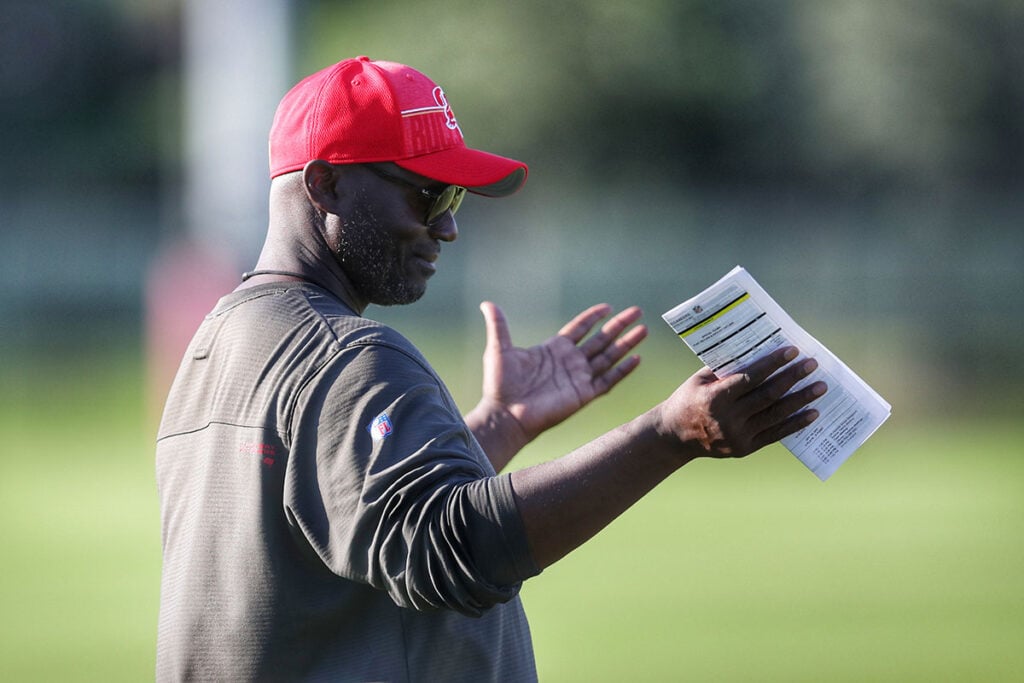
Bucs head coach Todd Bowles – Photo by: Cliff Welch/PR
Bowles has gone on record this offseason about wanting to play his cornerbacks closer to opposing wide receivers, which will only increase the chance of Zyon McCollum, Jamel Dean, and others coming down with interceptions and decrease the odds that quarterbacks have efficient days through the air against them.
Playing off coverage has allowed numerous quarterbacks to settle in and move the ball down the field. Look no further than Falcons quarterback Kirk Cousins doing much of his damage against the Bucs last season, throwing for 785 passing yards with eight passing touchdowns to just one interception in two games, both wins for the Dirty Birds.
Schematic stagnation costed the Bucs during their playoff loss to the Commanders. The defense took a hit losing Dean as Josh Hayes filled in. For as much as Hayes struggled and allowed the go-ahead touchdown to wide receiver Terry McLaurin, he is not the scapegoat. They failed to get home recording just one sack, and they failed to get Washington to send out their punt unit. In the biggest moment, Bowles’ defense was exposed and could not buy a stop.
To draw on a baseball analogy, he will have all the run support he needs this season.
With Tampa Bay’s offense returning all 11 starters, the defense will receive enough support to turn close losses last year into convincing wins and play complimentary football this year. Added depth and talent across the board defensively gives him more leeway to get back to being the creative, aggressive defensive playcaller that stymied the Chiefs during a dominant, 32-9 Super Bowl win at Raymond James Stadium.
His blitz rate remains among the highest in the league and he has shown continued innovation in that aspect over the years.
His proclaimed “Eureka” moment likely signals long-awaited coverage changes.
Now the actions have to back up the words, because there is no reason this defense should rank in the back-half on paper.
There Cannot Be Any More Late-Game Miscues That Cost Bucs Wins
Outside of pointed defensive struggles, late game and situational management has hurt Todd Bowles more than it has helped. Let’s look at the Chiefs game last year as the most noteworthy recent example.
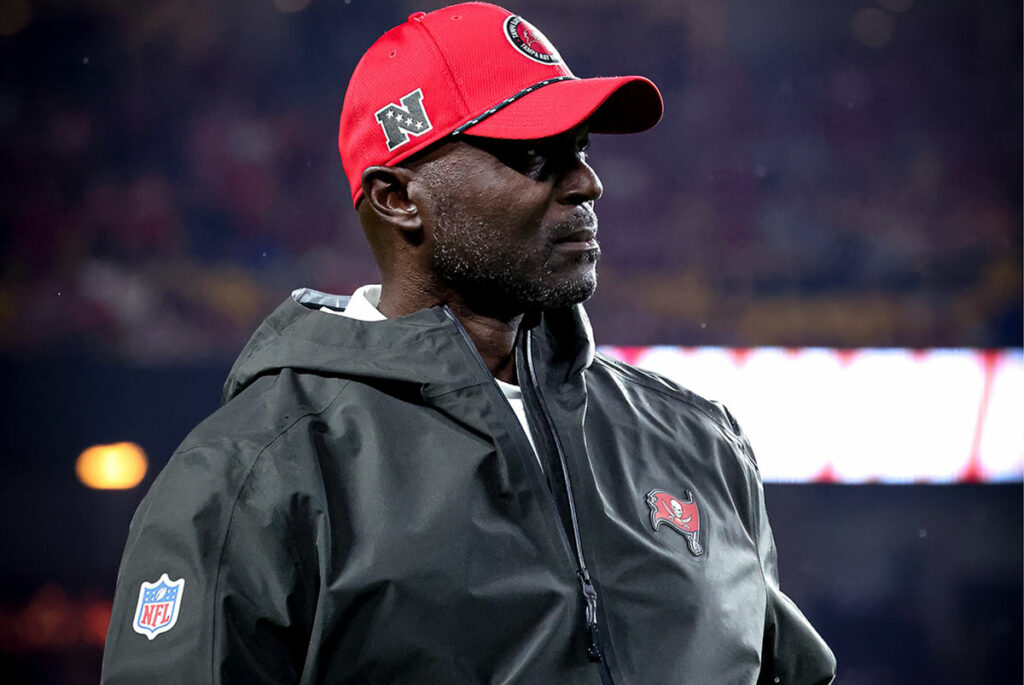
Bucs head coach Todd Bowles – Photo by: Jeffrey Jones/PR
Instead of electing to go for the win on the road in primetime against a 7-0 Kansas City team with a limited Bucs offense missing wide receivers Mike Evans and Chris Godwin, Bowles elected to play for overtime and the offense did not get the ball back as quarterback Patrick Mahomes led a 10-play, 70-yard touchdown drive as the Chiefs won, 30-24. His overall decision-making in that instance cost the team the game – had they converted a two-point conversion and got a defensive stop – after they fought hard throughout.
In other instances, the veteran coach has been vague explaining his reasons for not making important game management moments, such as calling a timeout against the Cowboys at the wrong time that could have swung the outcome in Tampa Bay’s favor. Fans have understandably been frustrated by his game management issues, as these two close defeats are at the top of mind from last season but far from the only teams this team has lost games in part to late game blunders and questionable choices.
The hope is that this will be alleviated with the hiring of director of football research Zach Beistline. Back at the 2025 NFL Annual Meetings in April, I asked Bowles how hiring Beistline will make him a better head coach in dealing with those kinds of situations.
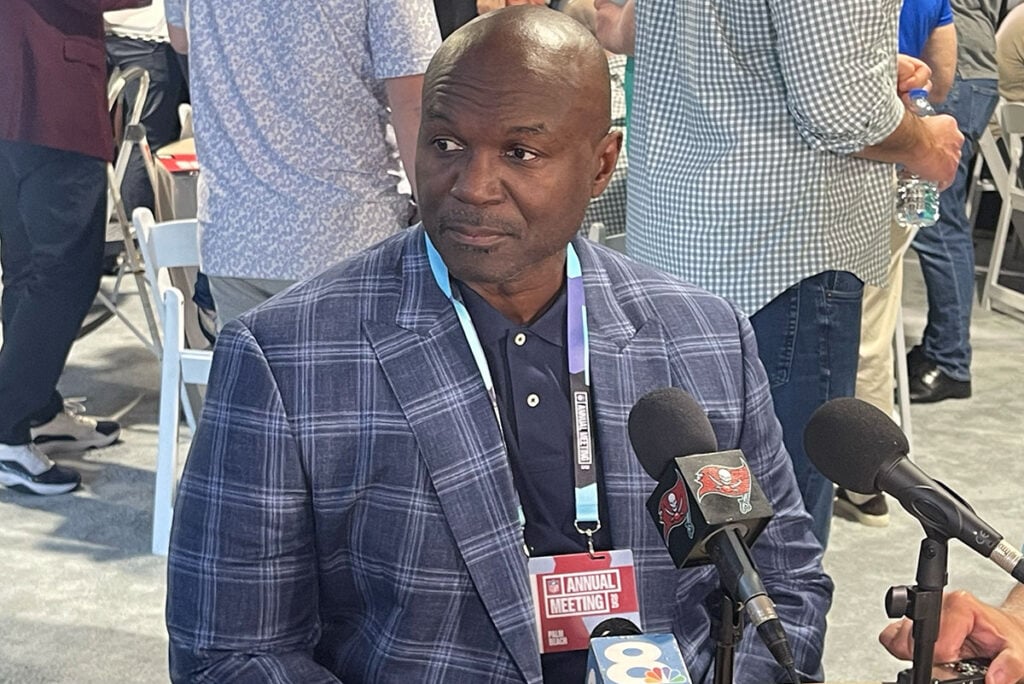
Bucs head coach Todd Bowles – Photo by: Bailey Adams/PR
“I think it helps a great deal,” Bowles said then. “We talked about this a little bit at the Combine, that I’ll be bringing somebody in. Just having a full-time game day manager with every situation allows me to be a better head coach on both sides of the football while still getting advice from a full-time guy instead of piecing it together from people up top that may know a few things instead of everything.
“We’re going to meet all offseason and during the season and go over situations and things, so we’ll have good communication on game day. I’d like to test that out in preseason, but I think [Zach] brings so much to the table from an experience standpoint and from a league-knowledgeable standpoint. It can’t help but make me a better coach and us a better team.”
Hopefully, this move pays dividends, but Beistline should not be pegged as the savior coming in to fix all of Bowles’ mistakes. Having been playing and coaching this game decades longer than yours truly has even been alive; he knows the ins and outs of this game more than almost anyone.
Not only does Bowles have the talent at his disposal to change the outcome of games, but he has his and now Beistline’s experiences to draw from – and a whole offseason to reflect on where he is right now.
Todd Bowles Needs To Show He Has Learned From His Time In The NFL
Todd Bowles is a football man, through and through.
Bowles’ professional football career started at Temple back in 1982, where he learned the tools of the trade playing safety. His 40+ years in and around the game since saw him carve out an eight-year NFL career, have a stint on the executive side, before beginning his coaching career in 1997. His time in coaching has seen him make two college stops and work for seven different teams at the highest level.
The stop that caught the most fanfare before now was with the Jets, where he was the team’s head coach from 2015-2018. Combining his head coaching record between a three-game stint with the Dolphins in 2011, New York, and with the Bucs, Bowles has gone 53-65 overall.
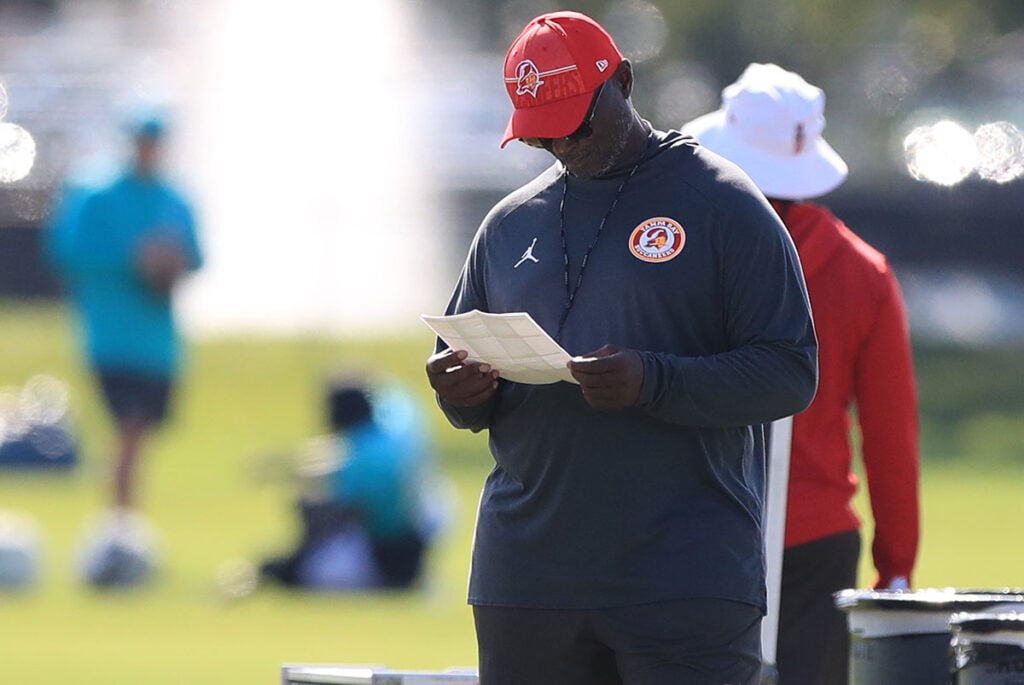
Bucs head coach Todd Bowles – Photo by: Cliff Welch/PR
It gets better when looking at his time in Tampa Bay, where he now has a 27-24 record – thanks to last year’s 10-7 record. A 1-3 playoff record points to the flaws and issues that have arisen and why Bowles’ time as head coach has often come under fire.
The organization has shown full faith giving him a multi-year contract extension, with the possibility of finishing his long career coaching the Tampa Bay Buccaneers. Having won a Super Bowl as a player, executive, and assistant coach, Bowles can make some history winning the Lombardi Trophy as a head coach. To get there and solidify his legacy – perhaps making a case to enter the Bucs Ring of Honor and the NFL Hall of Fame as a football lifer – all his time in the league comes down to what he does next.
Should Todd Bowles fix up the defense and make the most of its talent while improving as a game-manager, it sets him and the Bucs up for continued success as they look to go far this season. While he had excuses during his first few years leading the team as challenges arose and limitations with what he had to work with, there are no excuses now.
Adam Slivon has covered the Bucs for four seasons with PewterReport.com as a Bucs Beat Writer, Social Media Manager, and Podcaster. Adam started as an intern during his time at the University of Tampa, where he graduated with a degree in Sport Management in May 2023.
In addition to his regular written content, he appears every Thursday on the Pewter Report Podcast, has a weekly YouTube Top 10 Takeaways video series, and leads the managing of the site's social media platforms.
As a Wisconsin native, he spent his childhood growing up on a farm and enjoys Culver's, kringle, and a quality game of cornhole. You can find him most often on X @AdamLivsOn.

